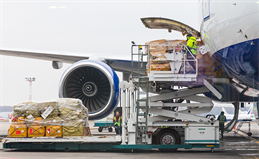
The slowdown in air cargo volumes has already bottomed, but the recovery path could remain rocky for a bit more, according to a recent analysis by Baltic Exchange.
Writing in a Baltic Air Freight Index (BAI) newsletter, Bruce Chan, director and senior research analyst covering global logistics and future mobility at Stifel, said conversations with industry players point to a start of recovery — albeit at a slow pace — as volumes remain soft.
"This earnings season, there has been a lot of focus on demand. Results have been weaker than expected, volumes softer than expected, and signs of an inflection more difficult to detect than we had anticipated. But we do feel, based on our conversations with management teams — both public and private — and our channel checks with shippers, that we have seen the bottom," Chan said.
"That bottom may be more of a flat hull than a V-shape. So, things are not likely to get much worse from a demand perspective, in our view," he added.
Nonetheless, the Stifel director and senior research analyst noted that the industry wouldn't see the market bounce back soon either, and the peak season this year would be modest, although better than last year.
Market to remain in a lull
"That does not mean the rise off the floor will be brisk," Chan said of the recovery. "We are modelling conservatively as our base case for peak season later this year."
"The good news is that the comp will be easier than it was in 2022 versus 2021. So while absolute freight levels probably will not be much to write home about, even a small holiday pickup would be an improvement on last year."
The Stifel executive noted that one of the key swing factors this year will be the level of confidence that retailers have in consumer demand and "whether they err towards caution in rebuilding stocks."
"The situation could change meaningfully as the year progresses, but even as we exit a challenging second quarter, we see green shoots with consumer confidence and inflation abatement, which could swing the balance in favour of a modest peak versus a muted one," Chan said.
Chan made the comments as he noted that "not much changed through July from August, with rates continuing to drag along the trough, alongside weak demand and overabundant capacity."
"We are in the midst of the second quarter earnings season, and most forwarders to date continue to report double-digit volume declines and yield declines in the 30% or greater range. At this point in the cycle, we believe that experience is roughly commensurate with the underlying capacity market since sell rates have now caught up with buy rates," he said.
For the period, Chan noted that July monthly readings from Shanghai to Europe and Shanghai to North America saw a 59% and 46% year-over-year drop in pricing. Hong Kong to Europe and Hong Kong to North America fell 43% and 45% year-over-year.
On a sequential basis, results have been relatively flat (most are actually still slightly negative) from June to July, grinding along the bottom as the destocking-driven import demand vacuum persists and post-Covid capacity resurgence continues, he added.
Cargo market oversupply to linger into 2024
Meanwhile, Chan pointed out that on the supply front, there continues to be excess cargo supply — which has been exacerbated by the influx of belly capacity.
"Pent-up demand for travel remains robust, even with inflationary pressure, and passenger capacity has still not recovered to pre-Covid levels. So, there is more capacity yet to come," he said.
"We believe this dynamic is most prevalent on transpacific lanes, with certain Asian markets having been slower to reopen and thus slower to normalize on the capacity front."
"As a general matter, we anticipate that global cargo market oversupply will linger well into 2024, if not beyond. So, any tightening on the rate front will most likely need to come via demand improvement," the Stifel director and senior research analyst further said.



